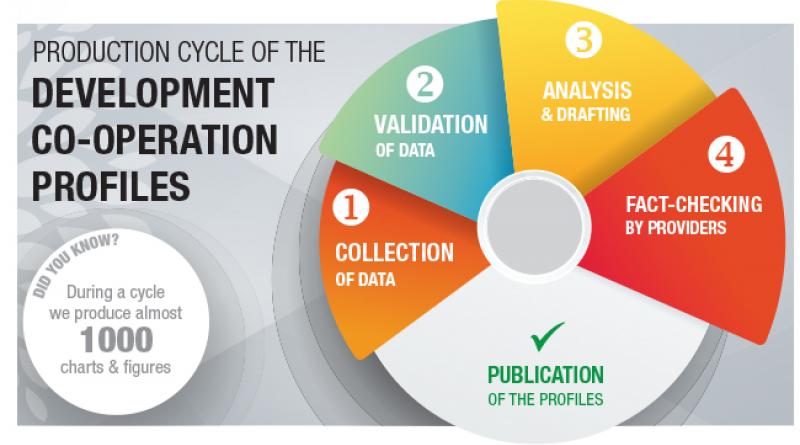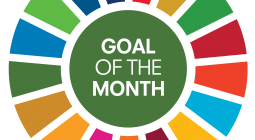OECD - Development Co-operation Profiles 2019 for all countries.

Development Co-operation Report
This report is the OECD’s annual flagship report on development co-operation. For more than 50 years, the Development Co-operation Report has brought new evidence, analysis and ideas to the Development Assistance Committee (DAC) and the international community more broadly, shaping policy reform, behaviour change and promoting best practices in development co-operation. Each year the report analyses a fresh policy issue that is timely, relevant or challenging for development co-operation policy and finance. In addition, the Development Co-operation Profiles detail aggregate and individual trends in policies, allocations and institutional set-up for a broad range of providers, including members of the OECD and its Development Assistance Committee (DAC), other countries and philanthropic foundations.
Development Co-operation Profiles
Read more about the latest trends
Profiles
The verified, comparable individual profiles provide detailed statistics and analysis for the aid programmes of 82 providers, including 24 private foundations
Official providers
- Australia
- Austria
- Azerbaijan
- Belgium
- Canada
- Chile
- Croatia
- Czech Republic
- Denmark
- Estonia
- European Union institutions
- Finland
- France
- Germany
- Greece
- Hungary
- Iceland
- Ireland
- Israel
- Italy
- Japan
- Kazakhstan
- Korea
- Kuwait
- Latvia
- Lithuania
- Luxembourg
- Mexico
- Netherlands
- New Zealand
- Norway
- Poland
- Portugal
- Romania
- Saudi Arabia
- Slovak Republic
- Slovenia
- Spain
- Sweden
- Switzerland
- Turkey
- United Arab Emirates
- United Kingdom
- United States
- Other providers reporting to the OECD at aggregate level
- Other providers with OECD’s estimates
Foundations
- Arcus Foundation
- Bernard van Leer Foundation
- Bill and Melinda Gates Foundation
- C&A Foundation
- Carnegie Corporation of New York
- Charity Projects Ltd (Comic Relief)
- Children's Investment Fund Foundation
- Conrad N. Hilton Foundation
- David and Lucile Packard Foundation
- Ford Foundation
- Gatsby Charitable Foundation
- Gordon and Betty Moore Foundation
- Grameen Crédit Agricole Foundation
- H&M Foundation
- John D. and Catherine T. MacArthur Foundation
- MasterCard Foundation
- MAVA Foundation
- MetLife Foundation
- Michael and Susan Dell Foundation
- Oak Foundation
- Omidyar Network Fund, Inc.
- United Postcode Lotteries
- Wellcome Trust
- William and Flora Hewlett Foundation
About the data
Trusted, transparent, objective: Rigorous production cycle that includes validation of data reported by providers, use of official, publicly available development finance statistics, analysis of complementary evidence (DAC peer reviews, OECD statistics and information gathered directly from providers), fact-checking by providers prior to publication.
Comparable: New user functions allow comparisons between providers across issues in interactive charts and open data sources.
Accountable: Tracking progress against international commitments, comparing policy priorities and aid allocations, overview of evaluation systems.
- Read the methodological notes on the Development Co-operation Profiles 2019
- Explore the full dataset on stats.oecd.org
Previous editions of the Development Co-operation Report
- 2018 - Joining Forces to Leave No One Behind
- 2017 - Data for Development
- 2016 - The Sustainable Development Goals as Business Opportunities
- 2015 - Making Partnerships Effective Coalitions for Action
- 2014 - Mobilising Resources for Sustainable Development
- 2013 - Ending Poverty
- Find more editions on iLibrary
* The Organisation for Economic Co-operation and Development (OECD) is an international organisation that works to build better policies for better lives. Our goal is to shape policies that foster prosperity, equality, opportunity and well-being for all. We draw on almost 60 years of experience and insights to better prepare the world of tomorrow.
Together with governments, policy makers and citizens, we work on establishing international norms and finding evidence-based solutions to a range of social, economic and environmental challenges. From improving economic performance and creating jobs to fostering strong education and fighting international tax evasion, we provide a unique forum and knowledge hub for data and analysis, exchange of experiences, best-practice sharing, and advice on public policies and global standard-setting.
The OECD brings together member countries and partners that collaborate on key global issues at national, regional and local levels. Through our standards and initiatives, our work helps drive and anchor reform in more than 100 countries around the world, building on our collective wisdom and shared values.
Member countries
Today, our 36 member countries span the globe, from North and South America to Europe and Asia-Pacific. They are represented by ambassadors, who are part of the OECD Council, which oversees and advises on our work, as set out in the OECD Convention. They engage with our experts and delegations from other countries, relay our data and analysis, and play a key role in our country review programmes, which are designed to encourage better performances. The European Commission participates in our work, but it does not have the right to vote nor does it take official part in the adoption of standards submitted to the Council.
July 2019





